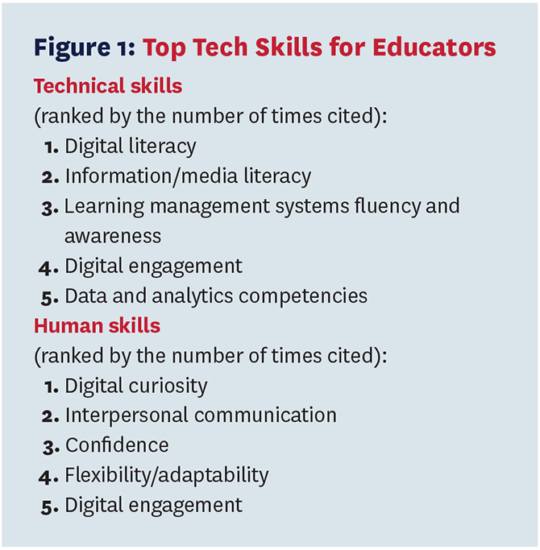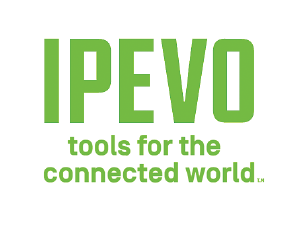Top Tech Skills for Educators
Digital technologies have taken a more prominent role in Canadian classrooms in recent years, but COVID-19 has pushed technology centre stage, requiring educators and students to strengthen their digital skills and potentially reconsider their traditional roles.
In April of 2021, the Information and Communications Technology Council (ICTC) released a new study, 21st Century Digital Skills: Competencies, innovations and curriculum in Canada, which examines, among other things, the top technical and human skills (or “soft skills”) required by educators and students.
A rapidly changing landscape
As the 2020/21 school year winds down and planning for the fall begins, uncertainty remains around the vaccine rollout and the coming term. What will the coming school year like? A return to in-class instruction, remote learning, or a mixture of both (hybrid learning)? What is certain is that the demand for digital skills will continue to grow.
When used skillfully as part of an educator’s toolkit, edtech possesses the ability to strengthen student engagement while encouraging academic success. The rise of technology in classrooms is surfacing new pedagogical best practices that encourage better collaboration, improved interactivity, and greater flexibility for educators and their students. These methods and their accompanying skills are likely to have long-lasting implications for educators who have adopted both in-class and online teaching responsibilities.
The 21st Century Digital Skills report, which draws on a series of interviews from subject matter experts across Canada, highlights the changing role of the K–12 educator to that of a “facilitator” of learning, which is a fundamental departure from the long-standing “sage on the stage” paradigm. As indicated by interview respondents, educational technologies have quickened the pace of this transition while also challenging outdated policies surrounding the use of cell phones and other technologies in the classroom.
This shift calls on educators to cultivate new technical skills, but it also requires strong “human skills.” Study interviewees also noted that human skills (which was preferred to the term “soft skills,” and includes critical thinking, creativity, and adaptability) are not vulnerable to the impacts of automation, artificial intelligence, or technology obsolescence.
These skills and competencies are reaching new and more nuanced levels as technology deepens considerations around, for example, critical thinking and media literacy. As one educator in the study stated:
“Media literacy now incorporates issues of fake news and how a student participates in a networked world. It’s how a student understands that they’re engaging and exploring new content, thinking critically and leveraging a wide variety of inclusive texts, tools and modalities. So it’s really going beyond simply reading and consuming. Media literacy provides the space to recognize culturally sustaining communication methods and how to recognize bias and privilege. Examining the rights, responsibilities and ethical implications of media in the creation of information and how, and to what extent, texts and tools amplify another’s narrative… it’s the understanding that technology enables all of this.”
– K–12 educator, Ontario
With summer approaching, teachers who are interested in improving their technical skills can take advantage of a wide array of online courses in digital technologies, which include media literacy.
Top technical skills for educators
An analysis of study interviews identified the following list of both technical and human skills, ranked in descending order by frequency of mentions:

Digital literacy Typically refers to competency in using core technologies (this can range from the use of search engines, office productivity software, basic operating system functions, up to database usage, coding, and computational thinking) and involves the ability to find, evaluate, create, and share content online. As the world increasingly adopts digital technologies, higher standards of digital literacy are needed to fully participate. Educators can work to improve their digital literacy through various available online training resources, by participating on various platforms, and as part of professional learning communities.
Information/media literacy This involves understanding how and why a media message is constructed – as well as its impact. In addition to accessing media and information, there is also the need to be able to analyze it critically, evaluate different media, and to ultimately be able to use it effectively. Educators can find a variety of media literacy resources, curriculum guides, lesson plans, and video tutorials through provincial teaching accreditation bodies (e.g. Ontario College of Teachers) teacher associations, individual school boards or online at places such as mediasmarts.ca.
The rise of technology in classrooms is surfacing new pedagogical best practices. This shift calls on educators to cultivate new technical skills, but also requires strong “human skills.”
Learning Management Systems (LMS) fluency and awareness As teachers are increasingly required to use LMS environments such as Moodle and D2L to deliver teaching materials, receive assignments, and communicate with students and parents, it is crucial they feel comfortable navigating this software. In addition to training provided by school districts, there are professional development conferences, web tutorials, and online courses through Coursera or edX.
Digital engagement Although “engagement” is typically understood to be linked to interpersonal communication, this term was often used by the educators we interviewed in discussing retention rates and maintaining student attention while using learning management systems or social media platforms such as Tik Tok, Snapchat, etc. It is not necessary for educators to become avid users of these social media platforms, but it is helpful for them to have an awareness of these growing trends and how they fit into the larger digital ecosystem.
Data and analytics competencies Digitization has greatly increased the amount of data available to decision makers, and this leads to increased interest in the use of analytics to make better “evidence-based decisions” and identify patterns that were not previously apparent. This is definitely the case in business and government, but it is also increasingly relevant in education. Increasingly, learning management systems are integrating data analytics for personalized learning insights as well as data dashboards (Gunawardena, 2017). There is a growing field of data analytics training at postsecondary institutions as well as online courses for classroom teachers.1
Best practices
Technology use in the classroom today varies greatly among educators, their schools, regions, and even provinces, but best practices have emerged. Study interviewees and education experts have highlighted the following:
- Exercise professional judgment as an educator to determine how best to support the individual learning needs of a student in both in-class and remote learning environments (technology is only a tool; the expertise of the teacher and the needs of their students are paramount).
- Appropriately identify essential learning priorities in curriculum and base assessments (formative, summative, or a mix of both).
- Emphasize learner self-assessment but also provide virtual and telephone conferences for descriptive feedback and discussion of next steps; this may include parent participation where appropriate. Ideally, provide several different options (with or without digital technology) to maximize accessibility.
- Consider and find ways to accommodate the unique needs or circumstances of individual students. This can include the use of digital accessibility features, like text-to-speech tools, text magnification options, and closed captioning.
- Find new and creative ways for learners to share what they are doing at home and generate ideas to demonstrate learning. These projects or demonstrated learning experiences can be shared through videoconferencing or LMS tools to enable peer-to-peer learning.
- Provide continual feedback on literacy and numeracy-related learning standards.
- Consider more formalized evaluation of prioritized learning standards for Grade 10–12 students (appropriate assessment measures should ensure students are familiar with testing and understand the requirements).
Looking to the future
While digital skills and new technology tools are important – and teachers need to receive both training and support to effectively work with these technologies – the subject experts consulted for ICTC’s 21st Century Digital Skills study noted that digital tools are part of a much larger educational transition. In this evolution, educators facilitate student development based on their individual needs and interests to help keep pace with a rapidly changing world.
Photo: iStock
First published in Education Canada, June 2021
The ICTC Study
The 21st Century Digital Skills report also includes a focus on educator training and support, an exploration of the top technical, academic, and human skills required of K–12 students, and examples of innovative technologies being leveraged in Canadian classrooms.
Note
1 See, for example, www.edx.org/course/analytics-for-the-classroom-teacher
References
Gunawardena, A. (2017). Brief survey of analytics in K12 and higher education. International Journal on Innovations in Online Education. doi: 10.1615/IntJInnovOnlineEdu.v1.i1.80
This department is generously sponsored by IPEVO
www.ipevo.com

